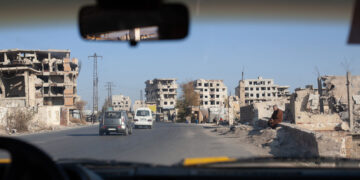Merlina Herbach is a trial monitor for the Syria Justice and Accountability Center.
عربي
When a court in Germany last month convicted a former Syrian colonel in the General Intelligence Directorate, part of the notorious mukhabarat, of crimes against humanity, it was widely seen as a landmark verdict. The Higher Regional Court in Koblenz sentenced Anwar Raslan to life in prison for being an accomplice to 4,000 cases of torture and deprivation of liberty, 27 cases of murder, and three cases of sexual violence, which all took place at an intelligence branch in Damascus where he oversaw its prison and interrogations of detainees.
While the verdict received widespread international attention, the assessment of the trial's importance for many Syrians themselves has been more muted. Some called it "just the beginning of a wider struggle." One former detainee who testified in Koblenz asked, "Is this the type of justice we're looking for?" This guarded and in some cases even ambivalent language from Syrians after the verdict not only reflects their own experiences in Syria and criticisms of the Koblenz trial itself, but also the bleak prospects for justice and accountability while President Bashar al-Assad and senior officials in his government remain out of the reach of any court.
Some of the trial's shortcomings were already apparent last year once it was underway in Koblenz, particularly regarding German criminal procedure and its application in cases under the principle of "universal jurisdiction"—the idea that any state can prosecute any individual accused of the core international crimes of genocide, war crimes, crimes against humanity and the crime of aggression committed anywhere else in the world. Since Syria is not a state party to the International Criminal Court's Rome Statute and because of a deadlock within the United Nations Security Council on referring the situation in Syria to the ICC, domestic trials under universal jurisdiction are the only avenue for Syrians to seek justice and accountability for war crimes committed in nearly 11 years of conflict. Germany and other countries on the forefront of conducting such trials should incorporate lessons learned in Koblenz, in addition to setting realistic expectations about their impact on the situation in Syria.
Germany and other countries on the forefront of conducting universal jurisdiction trials should incorporate lessons learned in Koblenz, in addition to setting realistic expectations about their impact on the situation in Syria.
- Merlina Herbach and Hassan Kansou
Syrians' own involvement in and contribution to these efforts are immense, including the work of Syrian civil society organizations to create a historical record of the Koblenz trial—efforts that are now continuing at the trial in Frankfurt of a Syrian doctor, identified as Alaa M., who is also accused by German prosecutors of crimes against humanity, among others counts of torture and murder. When prosecutors have no access to the crime scene, they must rely on civil society groups in providing reliable documentation, including official government material smuggled out of Syria, as well as the testimonies of victims and insiders. As in any fair trial, reliable and credible witness testimonies were absolutely crucial in the Koblenz case. Even though these prosecutions for atrocity crimes committed in Syria are being conducted abroad, in European courts for now, the role of Syrians themselves in facilitating them shows that the trials are, to a certain extent, by Syrians and for Syrians.
While critics might claim that universal jurisdiction trials will only be conducted when the suspect poses a threat to public security in the prosecuting state, or when states see other political advantages in prosecuting these crimes, the Koblenz trial proved otherwise. Prosecutors and other officials stressed that Germany must not be a safe haven for any perpetrator of international crimes—whether they are members of terrorist groups possibly recruiting new fighters, or former government affiliates disconnected from their former employer. German prosecutors also underscored that prosecutions under universal jurisdiction are a consequence of Germany's own past, relating to Nazi war crimes and the judicial handling of perpetrators of mass atrocities at the Nuremberg trials.
Universal jurisdiction trials therefore do not represent justice imposed on Syrians by foreign countries, as some critics contend. Trials like the one in Koblenz are rather justice and accountability supported by Syrians and conducted for Syrians. Many plaintiffs in the Koblenz trial supported this view, by saying that their involvement in the trial was also a way to represent many other Syrians who were not as lucky as themselves and are still in government detention or were killed in state-led violence in Syria.
While the impact of the Koblenz trial should not be overstated, it is nevertheless a small, first step toward justice and accountability for Syrians.
- Merlina Herbach and Hassan Kansou
As the first trial against former Syrian government affiliates accused of torture as a crime against humanity, Koblenz was an important sign that perpetrators from all sides of Syria's civil war, including its single largest perpetrator, the Syrian government, can be held accountable. Observers and parties to the trial welcomed the verdict against Raslan—and the judicial finding that the Syrian government is committing crimes against humanity—as a signal to the international community against the normalization of Assad's government and the looming deportation of Syrian refugees back to a country where the authorities have committed well-documented crimes against humanity. The Koblenz trial might also have positive impacts on Syrian efforts to seek justice and accountability in other European countries. The French Court of Cassation recently held that France has no jurisdiction over crimes against humanity committed in Syria by non-French citizens, thereby limiting the scope of universal jurisdiction cases that can be heard in French courts. Following the example of Germany and the Koblenz trial, France should implement relevant legislation to widen the scope of its jurisdiction on crimes against humanity.
There are still clear limits to these kinds of trial, however. The judgment of a Higher Regional Court in Germany, even when confirmed on appeal by the country's Federal Court of Justice, has no legally binding effects on any other state. Its deterrent effect on the Syrian government and its supporters is, unfortunately, also close to zero. The Syrian government will certainly not change its decade-long practices of torture and give up its expansive intelligence services that suppress civil society and any kind of dissent, simply because a German court found that they contributed to crimes against humanity.
Since the Koblenz trial was conducted against a former low-ranking officer, Eyad al-Gharib, and a mid-level former colonel, Raslan, the presiding judge explicitly stressed that "it was not the Syrian regime that sat on the defendant's bench in this trial." Raslan's trial, the judge noted, "only dealt with his personal contribution and liability for the charged crimes." Those most responsible for the crimes remain in power or at large. There is no sign that governments can enforce international arrest warrants against high-ranking members of the Syrian government in the near future.
While the impact of the Koblenz trial should not be overstated, it is nevertheless a small, first step toward justice and accountability for Syrians. The wealth of documentation obtained by and shared between civil society organizations, international investigative mechanisms, and domestic prosecutors, as well as the immense resources that officials in countries like Germany are putting in to prosecuting crimes committed in Syria, are a positive sign to Syrian victims. Different abuses from Syria's popular uprising turned civil war are being judicially addressed, and Syrians' stories are being heard and their suffering acknowledged, now in successive trials in Koblenz and Frankfurt.
But in the absence of a durable international judicial mechanism like the ICC, only cases against low-ranking and mid-level Syrian perpetrators have any prospects of reaching the trial stage, as prosecuting states can only physically get hold of these suspects. Those most responsible for the crimes committed by the Syrian government against its own people will remain out of justice's reach for now.





































